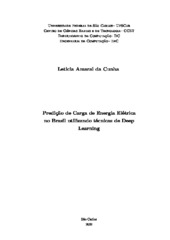Predição de carga de energia elétrica no Brasil utilizando técnicas de Deep Learning
Resumen
The open electricity market has stood out for being a competitive and dynamic way of trading an asset that was previously restricted to passive consumption. The freedom of negotiation provided to the participants of this market makes the prediction of its price, as well as the factors that affect it, extremely important. The purpose of this study is to develop three models based on different techniques of recurrent artificial neural networks and their comparative analysis. For this, the LSTM Feed Forward, LSTM bidirectional and GRU architectures must be applied to each of the time series explored. Average electric energy load data from the Brazilian free energy market between the years 2011 to 2021 are applied as an input for training, validation and testing processes. For the evaluation of the results, metrics of wide application were used, such as mean square error and mean absolute percentage error. The analysis of the models verifies the performance of the applied techniques, as well as possible causes for the performance of the established metrics. The results showed the bidirectional LSTM and GRU types as viable modeling results
Colecciones
El ítem tiene asociados los siguientes ficheros de licencia:

